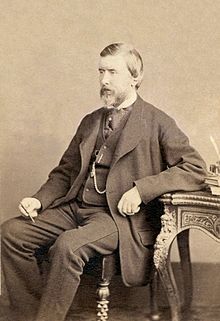John Henry Pepper
| John Henry Pepper | |
|---|---|
 |
|
| Born |
17 June 1821 Westminster, London, England |
| Died | 25 March 1900 (aged 78) Leytonstone, England |
| Residence | United Kingdom and Australia |
| Nationality | British |
| Fields | Chemistry |
| Institutions | Royal Polytechnic Institution |
| Known for |
Pepper's ghost and other scientific demonstrations Educational science books |
John Henry "Professor" Pepper (17 June 1821 – 25 March 1900) was a British scientist and inventor who toured the English-speaking world with his scientific demonstrations. He entertained the public, royalty, and fellow scientists with a wide range of technological innovations. He is primarily remembered for developing the projection technique known as Pepper's ghost, building a large-scale version of the concept by Henry Dircks. He also oversaw the introduction of evening lectures at the Royal Polytechnic Institution (University of Westminster) and wrote several important science education books, one of which is regarded as a significant step towards the understanding of continental drift. While in Australia he tried unsuccessfully to make it rain using electrical conduction and large explosions.
Pepper was born in Westminster, London and educated at King's College School. While there he became interested in chemistry, as taught by John Thomas Cooper. Cooper acted as a mentor to Pepper, who went on to become an assistant lecturer at the Grainger School of Medicine at the age of 19. In around 1843 he was elected a Fellow of the Chemical Society.
Pepper delivered his first lecture at the Royal Polytechnic Institution in 1847 and went on to take the role of analytical chemist and lecturer the year after. By the early 1850s he was its director. He introduced a series of evening classes covering educational and trade topics, and lectured by invitation at some of the most prestigious schools across England, including Eton, Harrow, and Haileybury. Amongst the students at Eton was Quintin Hogg, who would go on to become a philanthropist and benefactor of the Royal Polytechnic Institution. Pepper also lectured in New York and Australia. Pepper became a highly regarded science performer and often went by the name "Professor Pepper". He regularly demonstrated a range of scientific and technological innovations with the intention of entertaining and educating the audience about how they worked. He used many of these to expose the trickery behind deceptive magic, and became famous for a new technique now known as "Pepper's ghost".
...
Wikipedia
